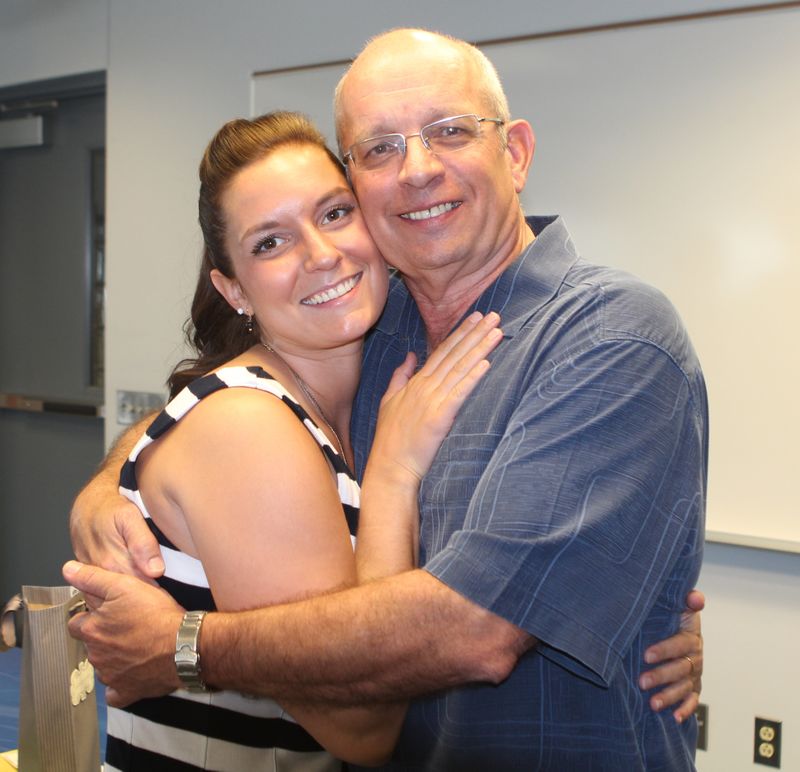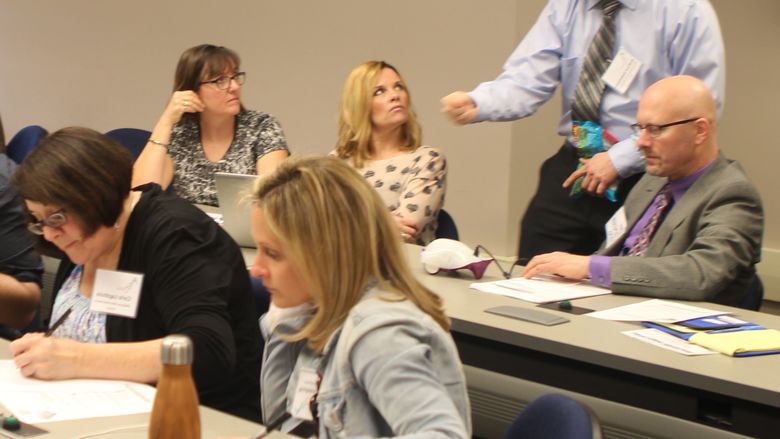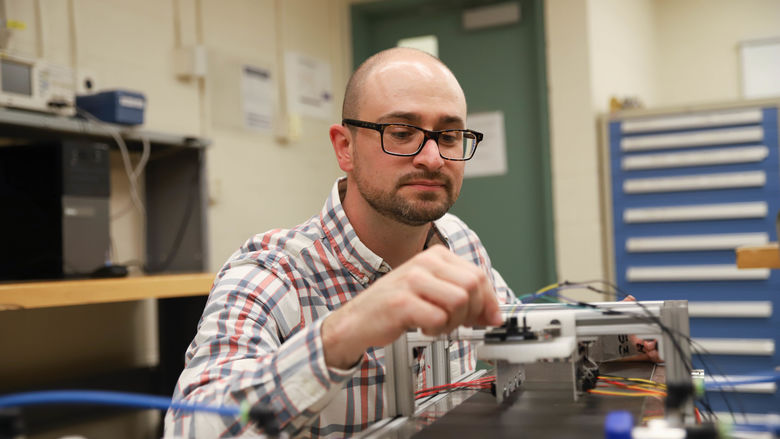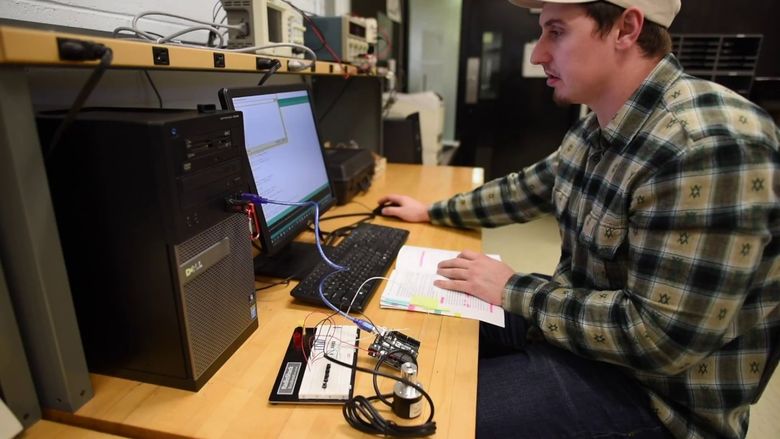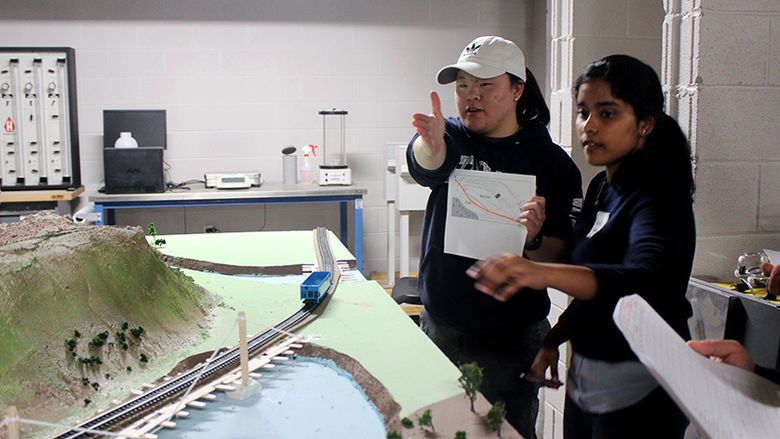
Penn State New Kensington engineering faculty Frank Kadi, right, and Ron Land, second from left, talk with former students at the retirement luncheon.
UPPER BURRELL, Pa. — After combining for 41 years of teaching experience in the Electro-Mechanical Engineering Technology (EMET) program, Ron Land, associate professor of engineering, and Frank Kadi, senior instructor in engineering, disconnected the circuits of their careers at Penn State New Kensington at the end of the spring 2016 semester.
"The bachelor of science degree in electro-mechanical engineering technology is a hallmark of our academic programming at Penn State New Kensington, and both Ron and Frank have worked hard to build it into a fine program that has provided the region with well-qualified engineering technicians,” said Andrea Adolph, director of academic affairs at the campus.
The two faculty members were honored April 26 with a farewell luncheon in the campus Conference Center. Colleagues, former students, friends and family turned out to show their appreciation and gratitude for both men's contributions to the EMET program and the campus. Faculty and staff members took to the lectern to share their encounters with the engineering gurus, while adding a touch of dissembling, augmented by exaggeration, for the amusement of the retirees and the audience. Kevin Snider, chancellor of the campus, presented replicas of the Nittany Lion Shrine to both engineers.
“Both faculty members have had a significant impact on the students who have come through the program, and they will be missed,” Adolph said. “The number of former students who attended the retirement event is a testament to how important Ron and Frank both have been to those whom they have educated over the years."
Ron Land
Land served as program coordinator for the EMET degree. He began teaching at the campus in 1989 and taught courses in electrical machinery, basic electrical circuits, and linear electronics. He also taught the senior capstone course on project design, construction and demonstration. Creativity is the foundation of the 400-level capstone course.
One group of Land’s students took creativity to another level in 2012 with an independent project that was not a part of their class work. The students designed and built an ancient siege machine, also known as a trebuchet, which is a type of catapult that works by using the energy of a raised counterweight to throw a projectile. The students challenged veteran engineers at the Electro-Optics Center, a defense technology company managed by Penn State, to a cantaloupe chunkin' contest. The competition was based on the punkin’ chunkin’ world championships that were broadcast by the Science Channel.
The students’ trebuchet stood 10 feet tall and 12 feet long and supported a 500-pound counter weight. The machine could launch a cantaloupe more than 150 yards at a target on a 40-foot incline. The Electro-Optics Center eked out a victory over the students based on distance and accuracy.
The New Kensington campus hasn’t been the only beneficiary of Land’s engineering technology acumen. In addition to serving as program coordinator for the campus, Land was the system-wide coordinator for EMET programs at Penn State Altoona, Penn State Berks and Penn State York. Along with New Kensington, the three campuses are the only units in the Penn State system of 24 campuses to offer the EMET degree. Land was the catalyst in bringing the EMET program to the University.
“I introduced the idea of creating the EMET program within the College of Engineering,” Land said. “I chaired the committee that developed the program for the four campuses.”
EMET emphasizes knowledge in all fields of engineering technology related to typical, highly automated manufacturing, production, or assembly plant processes. Graduates of the program learn the skills needed to apply current methods and technology to the development, design, operation and management of electro-mechanical systems, particularly in those industries where automated systems are prevalent.
“Ron has worked tirelessly at the national level to raise the prestige of engineering technologists, an effort that will benefit our students for years to come as their unique skills are better understood within industry,” Adolph said.
In addition to his teaching duties, Land was an active participant in academic projects, student activities, and campus recruiting efforts. He served on numerous campus committees and as chairman of the Faculty Senate. He also volunteered as the scoreboard operator for the basketball home games and as assistant coach for the campus coed golf team.
One of his proudest extracurricular activity moments was as a member of the campus faculty/staff basketball team that beat the Pittsburgh Steelers in a charity game at the campus. The 1991 Steelers team included Louis Lipps, Dermontti Dawson, Carnell Lake, Terry Long and Ernie Mills.
“I actually scored some points, and I remember being knocked into the first row of bleachers for trying to block out Dermontti following a missed foul shot,” Land said. “He gave me a one-arm push, and I don’t think he even realized he had done it.”
Prior to joining the Penn State faculty, Land was co-founder and technical manager of an engineering consulting firm, which primarily served the electric power utility industry. His primary industrial expertise is in power plant thermal-hydraulic performance modeling, power plant safety analysis, probabilistic risk assessment, and economic value-impact analysis of power plant modifications.
Land received a bachelor’s degree in electrical engineering from the Georgia Institute of Technology and a master’s degree in electrical engineering from the California Institute of Technology.
The Washington Township resident’s passions are not limited to academia. Golf and shooting have been lifelong avocations, and retirement might provide the opportunity to shave strokes and increase precision.
Frank Kadi
While Land was involved with the electrical component of the EMET program, Kadi handled the mechanical side. He taught numerous upper-level courses, including Fluid Mechanics and Heat Transfer, Measurement Theory and Instrumentation, Mechanical Drives, and Mechanics for Technology.
A late bloomer as an educator, Kadi is enjoying a second retirement. He joined the campus faculty in 2002 after a 31-year career that focused on new product development in the fields of cryogenics, low temperature physics, and vacuum technology. His engineering career began as a development engineer with Air Products and Chemicals Inc. in Allentown, and continued at Leybold Vacuum Products Inc. in Pittsburgh. His responsibilities progressed from chief engineer to vice president of engineering and director of technology until his retirement in 2002.
Kadi’s engineering interests carried over naturally to the classroom.
“I have always felt most comfortable teaching subjects aligned with my industrial work experience, including heat transfer, fluid mechanics, vacuum technology, machine design, and strength of materials,” Kadi said.
During his industrial career, he earned a master’s degree in mechanical engineering from the Massachusetts Institute of Technology and a doctorate in mechanical engineering from Lehigh University. The advanced degrees were secured with an eye on a career in academia. However, a combination of factors put a hold on his calling.
“My original motivation was making the transition from the industrial to the academic arena,” Kadi said. “As it turned out, the attraction of interesting and plentiful opportunities for young graduate engineers in the mid-1960s was too much of a temptation, and my thoughts of making a transition to academia had to take a back seat to raising a young family and advancing my career in engineering.”
The wait was fortuitous for both Kadi and his students. His knowledge of the engineering industry enhanced his students’ learning from the textbook.
“While I had some experience teaching undergraduates while attending graduate school, I soon found that the ability to supplement classroom lectures with over 30 years of experience as a development engineer made the classroom experience more interesting, not only for my students, but for the instructor as well,” Kadi said. “My original plan was to teach for four to five years. Before I realized it, my plan quickly turned to 14 years.”
A student-centered educator, Kadi is impressed with the quality of students at the New Kensington campus and their commitment to the EMET program. Especially, since many work full time and juggle work, school and family.
“I am truly amazed at how well most students continue to do in their coursework in spite of the heavy burden many of them carry in terms of the hours devoted both to their jobs and to their class attendance and assignments,” Kadi said. “I have often wondered how well I would have done under similar conditions. The continued success of our students under these circumstances is truly noteworthy.”
When he is not in the classroom, Kadi advocates for the EMET program and the campus. He sits on a variety of committees, including the Penn State Commonwealth College EMET Curriculum Committee and the Penn State New Kensington Industrial Advisory Committee. He previously chaired the Curricular Affairs Committee and University College Promotion Review Committee.
“Frank has provided strong oversight of the mechanical engineering aspects of the program,” Adolph said. “He has always been willing to take on new duties that have made the curriculum even stronger.”
In a career that spanned 45 years, Kadi looks back satisfied. He had utilized all his skills and left industry and academia better places to work and teach. Along the way, he met people who made him a better engineer and educator.
“I can honestly say that if I had the opportunity to go back in time and begin my career over again, I would not change a single thing,” Kadi said. “I have thoroughly enjoyed my years in the engineering profession and the opportunity I had at Penn State New Kensington to get to know the many dedicated faculty members, administrators and staff members. And I had the chance to, hopefully, influence the future careers of at least some of our students in some meaningful way.”
Kadi’s final retirement provides more time for a myriad of leisure activities, including opportunities for he and his wife, Mary Lou, to visit with their grandchild. He enjoys biking on local rails-to-trails paths, woodworking, gardening and landscaping. Of course, he also is a machine shop hobbyist, so he will keep those mechanical engineering skills honed.
Bill Woodard
Alumni and Public Relations Specialist
